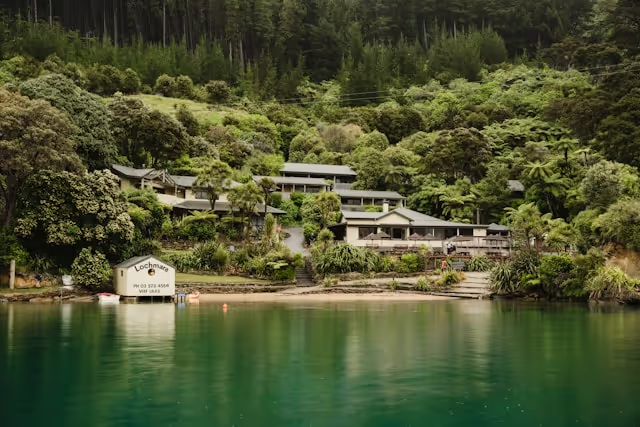
Blog
Where to Live When You Get Older
Your guide to a golden retirement address
Sun-drenched beaches, rolling vineyards, and stunning mountain ranges – these are just a few things that make New Zealand a dream location for many. But as we reach our golden years, the question of where to live takes on a new significance. Whether you're picturing yourself surrounded by bustling city life or nestled in a relaxed region, the key is finding a place that supports your well-being and long-term needs that are within your budget.
Let’s dive into the diverse living options available to New Zealanders as they enter retirement. We'll explore the benefits and drawbacks of staying put, downsizing, and venturing into new territories.
Staying Put: Comfort and Familiarity
For many, the familiar walls of their long-held home offer a sense of security and comfort that's hard to replicate. It's the place where they've raised their children, celebrated milestones, and weathered life's storms. It's a tangible connection to the past, a comforting reminder of simpler times. This option makes perfect sense if your current residence caters to your needs.
Benefits of Staying Put in Retirement
While moving to a new location can be exciting, there are many advantages to staying in your current home:
- Established roots: Your home is likely filled with memories and connections to your community.
- Known surroundings: Familiarity with the local amenities, transportation, and healthcare options.
- Comfort and security: Being in a familiar place can provide a sense of comfort and security, especially as you age.
- Avoiding moving costs: Moving can be expensive, costs include packing, transportation and potential renovations.
- Lower costs of living: Staying in a familiar area might have lower living costs compared to moving to a more expensive region.
- Family and friends: You likely have a strong support network of family and friends nearby.
- Community connections: You're already part of the local community, with established relationships and connections.
- Familiar routine: Staying put allows you to maintain your daily routines and habits. Moving can be stressful, and staying put can eliminate the need for major adjustments. Having a familiar routine can contribute to peace of mind.
Upgrade Your Home for Retirement
Here's how to make your existing space "golden years" ready if you are keen to stay put:
- Accessibility upgrades: Look to install ramps, grab bars, and improve lighting to ensure a safe and easy living environment. At the upper end, renovations might include a stair lift, widening doorways for walker or wheelchair access, and ensuring bathrooms and kitchens are also suitable for walker or wheelchair use (including a shower you can wheel in and out of).
- Smart home technology: Consider smart thermostats, voice-activated assistants, and automated security systems for added convenience and peace of mind.
- Home help: Explore in-home care services for assistance with cleaning, errands, and meal preparation.
The Realities of Staying Put
However, staying put isn't always the answer. Consider these challenges:
- Maintenance burden: Large houses often require significant upkeep. As you age, maintaining a large home can become physically demanding and time-consuming. The same is true of older properties.
- Accessibility: If your home isn't designed for ageing, you may need to make significant modifications to accommodate your needs.
- Isolation: If you’re living in a remote area, this might limit access to social activities and amenities.
- Financial considerations: Holding onto a large property can strain your finances, especially if it's not generating income. Property-related costs may increase over time. For instance, council rates will likely only become more expensive, and the same can be expected of utilities and insurance.
- New experiences: Staying put may limit your opportunities to explore new places and experiences. If your current community doesn't offer the desired social activities or amenities, you may limit your options.
- Healthcare: As you age, your healthcare needs may change, and your current location may not provide the necessary facilities or specialists.
- Lifestyle: Your lifestyle preferences may change over time, and your current home may not meet your evolving needs.
- Nostalgia: While familiarity can be comforting, it can also limit your ability to embrace new experiences and adventures. Staying in the same place can sometimes lead to a sense of stagnation or lack of excitement.
While moving can be exciting, staying put in retirement also offers numerous benefits. By carefully considering individual circumstances, you can determine the best option for your well-being and lifestyle.
Downsizing: Freedom and Flexibility
Downsizing involves moving to a smaller, more manageable home. This could be a cosy apartment, a low-maintenance townhouse, or even a retirement village unit.
Benefits of Downsizing
Here's what makes it so appealing:
- Reduced maintenance: Smaller spaces require less cleaning and upkeep, freeing up your time and energy. Downsizing commonly occurs in a more modern, low-maintenance, property.
- Financial benefits: Downsizing can unlock capital that can be used for travel, healthcare costs, or simply enjoying life's finer moments.
- Accessibility: Retirement villages and senior communities often offer amenities like on-site healthcare, fitness centres, social events, pools, communal dining choices, and so on.
- Community living: These communities can provide a sense of belonging and connection with like-minded individuals.
- Improved Lifestyle: Downsizing can lead to a more simplified and less stressful lifestyle.
Challenges of Downsizing
But downsizing isn't for everyone. Consider these potential downsides:
- Loss of space: It sometimes take time to adjust from having multiple bedrooms and lounges to a much smaller living space and being able to fit everything in.
- Location change: Moving away from familiar surroundings could disrupt established routines and social connections.
- Community fit: Not every retirement village is a perfect fit. Research different options to find one that aligns with your personality and interests.
- Emotional attachment: Letting go of cherished belongings and memories can be emotionally challenging.
- Financial considerations: While downsizing can free up capital, there may be costs associated with moving, such as agency fees, legal fees, and body corporate fees. As downsizing often occurs in a more modern property, it may not provide much of a cost saving when compared with a retiree moving from what is usually an older, larger property.
Tips for Successful Downsizing
- Future proof: Think about how your life, and health, may change as you age.
- Start early: Begin planning your downsizing well in advance to give yourself plenty of time to declutter and organise your belongings.
- Declutter: Sort through your belongings and get rid of anything you no longer need or use. Donate, sell, or give away items.
- Create a floor plan: Draw up a floor plan for your new home to visualise how your belongings will fit. This will help you determine what to keep and what to let go of.
- Embrace the change: Downsizing can be a positive experience. Focus on the benefits and the new opportunities it presents.
Find Your Kiwi Retirement Oasis
Retirement can be the perfect time to embark on a whole new adventure! Explore parts of New Zealand you may not have before with a move to a new region:
- Beach: Imagine starting your mornings with a brisk walk along a golden beach. Coastal towns like those in the Coromandel Peninsula or around Nelson offer a relaxed pace of life and access to water activities.
- Vineyard charm: Nestled among rolling vineyards and wineries, towns like Matakana or Blenheim offer a sophisticated atmosphere with a focus on good food and wine.
- Lake life: Lakeside towns like Taupo provide stunning scenery and opportunities for water sports, fishing, and enjoying nature.
- Mountain majesty: For those who love the outdoors, mountain towns like Queenstown offer scenic trails, winter sports, and a sense of adventure.
Whether you're drawn to the vibrant coastal cities, the serene countryside, or the rugged wilderness, there's a perfect spot waiting for you.
North Island Gems
- Bay of Islands: Renowned for its picturesque harbours and stunning islands, the Bay of Islands provides a laid-back lifestyle with plenty of opportunities for sailing, fishing, and exploring nature.
- Coromandel: The Coromandel Peninsula offers a mix of coastal towns and rural retreats. Enjoy its pristine beaches, hiking trails, and unique geothermal activities.
- Tauranga: This popular retirement destination boasts a sunny climate, beautiful beaches, and a range of amenities. However, be prepared for higher housing costs in Tauranga.
- Whangārei: Whangārei might offer a more affordable alternative to popular retirement destinations. Enjoy its beautiful beaches, thriving arts scene, and easy access to Auckland.
South Island Treasures
- Marlborough: Known for its world-class wineries and stunning scenery, Marlborough offers a relaxed lifestyle with plenty of outdoor activities.
- Nelson: This sunny city is surrounded by national parks and offers a vibrant arts and culture scene. Enjoy Nelson’s beautiful beaches, trails, and friendly community.
- West Coast: For those seeking a more off-the-grid retirement, the West Coast offers stunning landscapes, affordable housing, and a peaceful atmosphere.
- Central Otago: The Central Otago region is famous for its vineyards, stunning scenery, and outdoor activities. Enjoy its clear skies, crisp air, and friendly communities.
Related articles:
- Your Boomerang Kids Could Ruin Your Retirement
- Early Retirement Pitfalls – And How to Avoid Them
- How To Retire Early
- Financial Wellbeing in Retirement
- Retire on your own terms
Key Retirement Destination Factors to Consider
When choosing your retirement destination, consider the following factors:
- Climate: Do you prefer a warm, sunny climate or a cooler, more temperate one?
- Amenities: What amenities are important to you, such as hospitals, shopping centres, and recreational facilities?
- Lifestyle: Do you want a bustling city life, a quiet rural retreat, or a mix of both?
- Cost of living: Research the cost of housing, utilities, and other expenses in your desired location. Can you comfortably afford your chosen living situation, including potential healthcare costs?
- Community: Consider the size and type of community you prefer, whether it's a small town, a city suburb, or a retirement village.
- Healthcare access: Ensure that the area you choose has access to quality healthcare facilities and specialists, because as you age your needs will become more pressing. If you live long enough, its likely at some stage you will require assistance with daily activities, and your location will need to cater to your physical needs.
- Relationships: Even the most idyllic and otherwise perfect location may be undesirable if you need to move far away from a close-knit group of friends, or if you are heavily focussed on your children and grandchildren and will see them a lot less by making the move.
- Transportation: Evaluate the availability of public transportation or if you'll need to rely on your own vehicle.
- Activities and interests: Think about the hobbies and activities you enjoy and whether they are available in your chosen location.
Finding the Perfect Fit
The best way to find your ideal retirement destination is to visit different areas and experience them firsthand. Talk to locals, explore the surroundings, and imagine yourself living there. With careful forethought, you'll be sure to find the perfect place to enjoy your golden years in New Zealand.
The Bottom Line: Where to Live When You Get Older
Choosing where to live in retirement is a personal journey which requires careful consideration of your individual needs, preferences, lifestyle, and future requirements. Whether you opt to stay put in your current home, downsize to a smaller property, or embark on a whole new adventure in a different part of New Zealand, the key is to find a place that aligns with your vision for a fulfilling retirement.
Remember to think through factors like climate, amenities, lifestyle, cost of living, community, healthcare access, support network, transportation, and activities.
Don't be afraid to step outside your comfort zone and explore new possibilities. Whether it's a coastal town, a rural retreat, or a vibrant city, your golden years are an opportunity to live life on your terms, so make the most of it.
Imagine yourself waking up each morning to the sound of birdsong and the smell of fresh coffee. Picture yourself exploring stunning beaches, walking through lush forests, or sipping wine at a local vineyard. You’ve worked hard and your retirement home should be more than just a place to live; it should be a sanctuary where you can relax, rejuvenate, and enjoy life to the fullest.
It’d be the pleasure of one of our trained professionals to help you work through any of the topics mentioned above, so get in touch today.
You may also like:

Why the Rich Get Richer and the Poor Get Poorer

Why are credit card interest rates so high?


